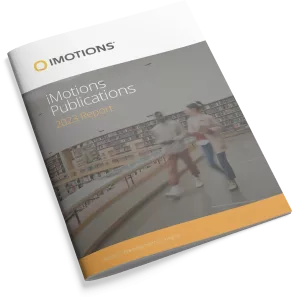-
A User Study on User Attention for an Interactive Content-based Image Search System
User attention is one of the fundamental indications of users’ interests in search. For content-based image search systems, it is important to understand what users pay attention to, and thus engage users more in the search process. It remains a big challenge to design a user-centered interactive interface that serves well for both user interaction […]
-
EXPRESS YOURSELF: FACIAL EXPRESSION OF HAPPINESS, ANGER, FEAR, AND SADNESS IN FUNDING PITCHES
We build upon theory from evolutionary psychology and emotional expression, including basic emotion theory and the dual threshold model of anger in organizations, to extend knowledge about the influence of facial expressions of emotion in entrepreneurial fundraising. First, we conduct a qualitative analysis to understand the objects of entrepreneurs’ facial expressions of four basic emotions […]
-
How are students’ emotions related to the accuracy of cognitive and metacognitive processes during learning with an intelligent tutoring system?
Abstract: The goal of this study was to investigate 65 students’ evidence scores of emotions while they engaged in cognitive and metacognitive self-regulated learning processes as they learned about the circulatory system with MetaTutor, a hypermedia-based intelligent tutoring system. We coded for the accuracy of detecting students’ cognitive and metacognitive processes, and examined how the […]
-
Self-Reported Emotions and Facial Expressions on Consumer Acceptability: A Study Using Energy Drinks
Emotional responses elicited by foods are of great interest for new product developers and marketing professionals, as consumer acceptance proved to be linked to the emotions generated by the product in the consumers. An emotional measurement is generally considered an appropriate tool to differentiate between the products of similar nutritional value, flavour, liking and packaging. […]
-
Human and Human-Interfaced AI Interactions: Modulation of Human Male Autonomic Nervous System via Pupil Mimicry
Pupillary alterations in virtual humans induce neurophysiological responses within an observer. Technological advances have enabled rapid developments in artificial intelligence (AI), from verbal systems, to visual AI interfaces with the ability to express, and respond to emotional states of a user. Visual AI interfaces are able to change their physical parameters, such as pupil diameter. […]
-
Value co-creation in sustainable tourism: A service-dominant logic approach
To mainstream sustainability, we need to understand the value gained from sustainability by users. We apply a user-centered design methodology to develop an agile, iterative, incremental, and reflexive process to understand the sustainability value proposition for Lufthansa City Center travel agents. We analyse the failure of sustainability communications within the online platforms used by these […]
-
Soundtrack design: The impact of music on visual attention and affective responses
Through music, film composers attempt to affect the audience’s emotions and visual attention; however, little empirical evidence exists characterizing the mechanisms whereby music affects viewers. We conducted a mixed-design experiment with 60 participants to explore the effect of music on viewers’ visual attention and affective responses to a film. Music led to quicker first fixations […]
-
The Influence of Price on Purchase Intentions: Comparative Study between Cognitive, Sensory, and Neurophysiological Experiments
Price is considered one of the most important attributes in consumer’s choice. On the other hand, consumer’s knowledge about price tends to be imprecise. This study aims at providing new insights analyzing consumers’ perception of retail store brand (focused on Skin Care Products) comparing with two other skin care products, a premium, and a popular […]
-
DeepTake: Prediction of Driver Takeover Behavior using Multimodal Data
Automated vehicles promise a future where drivers can engage in non-driving tasks without hands on the steering wheels for a prolonged period. Nevertheless, automated vehicles may still need to occasionally hand the control back to drivers due to technology limitations and legal requirements. While some systems determine the need for driver takeover using driver context […]
-
Neurocognitive processing of infants
Emerging evidence indicates that mothers and non-mothers show different neurocognitive responses to infant stimuli. This study investigated mothers’ psychophysiological, cognitive and neuronal responses to emotional infant stimuli. A total of 35 mothers with four months old infants and 18 control women without young children underwent computerized tests assessing neurocognitive processing of infant stimuli. Their eye-gazes […]
Research Report 2024
In-depth look at the scientific landscape as powered by iMotions software, showcasing groundbreaking research and the impact of our tools in various scientific and industrial fields.
iMotions Science Resources
Looking for white papers, validation reports or research show casing iMotions Multimodal capabilities?
Share Your Research

850+ universities worldwide with an iMotions human behavior lab
73 of the top 100 highest ranked universities
710+ published research papers using iMotions
iMotions is used for some of the most interesting human behavior research studies carried out by top researchers around the world. Contact us to have your publication featured here.
The authors of these publications have used iMotions as a software tool within their research.
“Software should be cited on the same basis as any other research product such as a paper or a book; that is, authors should cite the appropriate set of software products just as they cite the appropriate set of papers” (Katz et al., 2020).
We therefore encourage you to cite the use of iMotions where appropriate.
How to cite iMotions
APA
iMotions (10), iMotions A/S, Copenhagen, Denmark, (2024).
Note: adjust the version and year where relevant.
5 Most Popular Blogs
Learn How to Conduct Human Behavior Research with iMotions
Publications
Read publications made possible with iMotions
Blog
Get inspired and learn more from our expert content writers
Newsletter
A monthly close up of latest product and research news




